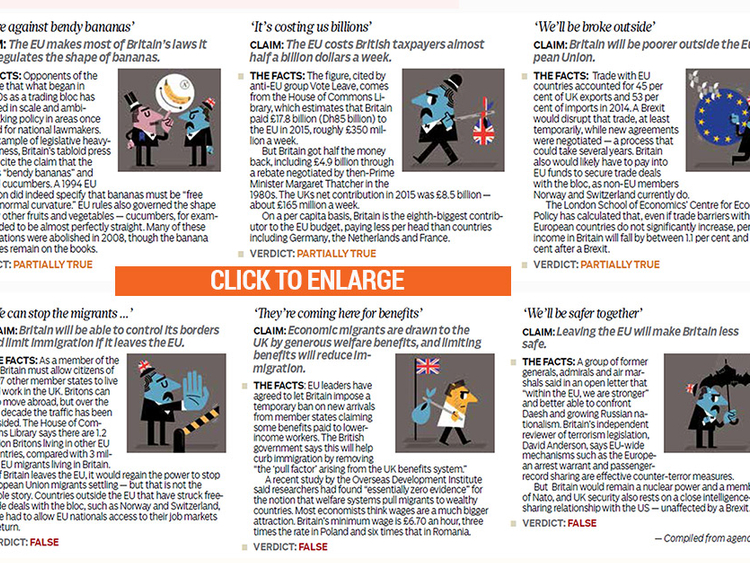Dubai: Is Queen Elizabeth in favour of Britain leaving the European Union (EU)?
Buckingham Palace says Queen is “politically neutral” in the EU referendum campaign, after a newspaper report said that she had expressed strong Eurosceptic views.
The Sun said she vented her anger with Brussels at the strongly pro-EU Nick Clegg during a lunch at Windsor Castle when he was deputy prime minister. The former Liberal Democrat leader dismissed the report as “nonsense” while the palace said it would not comment on “spurious, anonymously sourced claims”.
The paper quoted a “senior source” as saying that people who heard their conversation “were left in no doubt at all about the Queen’s views on European integration”.
“It was really something and it went on for quite a while. The EU is clearly something Her Majesty feels passionately about,” the source was quoted as saying.
However, a palace spokesman said: “The Queen remains politically neutral as she has for 63 years. We will not comment on spurious, anonymously sourced claims. The referendum is a matter for the British people to decide.”
Clegg wrote on his Twitter feed that the story was “nonsense”, and he had “no recollection of this happening”.
A spokesman for Clegg added: “This is categorically untrue. Nick has no recollection of this conversation, and it is not the sort of conversation you forget.”
If true, it wouldn’t be the first time the Queen made a rare intervention on the political stage.
Days before the knife-edge referendum on Scottish independence she expressed the hope that Scottish voters would “think very carefully about the future” before casting a ballot.
The comments by the Queen came as she left Crathie Kirk near her Balmoral estate in Aberdeenshire after a Sunday morning service. The Queen told a well-wisher: “Well, I hope people will think very carefully about the future.”
The Queen’s remarks were interpreted by no campaigners as helpful to their cause, that a vote for independence would lead to an irrevocable break with the UK.
In the run-up to the EU referendum vote on June 23, Britain’s newspapers are mostly campaigning in favour of the so-called “Brexit”.
In late February, the Daily Express decided to conduct an online poll to find out how Briton’s would vote. The results were striking, and allowed the newspaper to lead with a dramatic front page the following day, expressed, as with all its splash headlines, in bold capital letters: “92 per cent want to quit the EU.”
The Express’s anti-Europe obsession is no surprise — the paper has been running an explicit “crusade” to leave the EU since 2010 — and it is easy to disregard its polling results, given the sampling method (a question posed on the newspaper’s website) and extremely select electorate.
But David Cameron and the leaders of the Remain campaign will not easily dismiss the numbers behind them. Around 48,000 people took part in the online poll; 408,000 buy the Express. More importantly, the Express is far from the only newspaper that has already committed itself to doing all that it can to ensure Britain wakes up on June 23 ready to leave the EU. Where will the rest of Fleet Street fall? That’s just another item on the PM’s “To worry about” list.
In 1975, the last time the UK went to the polls over the issue of EU membership, the yes vote won by a very comfortable margin — 67.2 per cent to 32.8 per cent. On that occasion, however, the entire national press was vociferously in support of staying in. The Daily Express, Daily Mail, Daily Telegraph, Times, Guardian, Sun, Mirror and Financial Times all spoke with one voice: it must be “yes”.
Those committed to keeping Britain in the EU can only dream of such a day this time. While most of the papers are yet to formally declare their position, Europhiles can confidently count on a much smaller number of supportive front pages on news-stands on June 23.
For all Fleet Street’s sound and fury, the really big question is how significant any of it is, in an age when newspaper sales are plummeting and news is consumed much more broadly. Political scientist John Curtice says his research has led him to conclude that, “Yes, newspapers have smallish, but noticeable effects on readers. But given now the proportion of people who read the newspapers is quite small, their ability to have any aggregate impact is much less.”
Even if newspapers don’t change the minds of the public, argues Tom Felle, lecturer in news and digital journalism at City University in London, “they frame the narrative” — talk radio, programmes like Question Time and others pick up and follow the front pages, he says.
All of which could make an overwhelmingly pro-Brexit press very significant if the polls are close. But are they? Polling on the referendum has been broadly consistent since the autumn, notes Curtice — the problem is they don’t agree with each other. “The internet polls on average have been saying about 50-50 [among decided voters], and the telephone polls say 60-40 [in favour of remain].” Given the experience of pollsters at the general election, however, “we don’t know which is right”.
If the phone polls are more accurate, as is often assumed to be the case, “then maybe remain can be reasonably confident, but if it’s anything much less than that, then actually we’re in for a pretty tough old fight.” He notes that opinion shifted quite sharply during the final weeks of the Scotland referendum.
Given the collected efforts of a significant proportion of Fleet Street in the coming months, this one looks set to be close.












